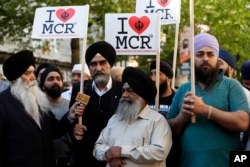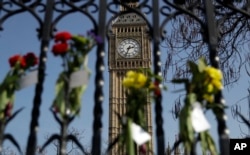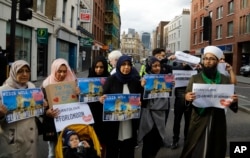As Britain confronts a wave of terrorist attacks, pressure is mounting on its Muslim community to do a better job of identifying potential extremists and policing itself.
At the forefront of such efforts is Nazir Afzal, a Muslim and former top prosecutor. Afzal gained national attention for pioneering difficult prosecutions to tackle honor-based violence and forced marriage, as well as child sexual exploitation and grooming in the northwest of England, including Manchester, the site of last month's suicide bombing that killed 22 people at a pop concert.
In an exclusive interview, Afzal said the community has, in general, done a good job of making sure mosques are no longer a forum for radicalization of young Muslims; but, he adds, more needs to be done, both by Muslims and British authorities, to curb the country's dangerous Islamist minority and counter the jihadists' narrative.
"Very few people get radicalized in mosques and places of worship," said Afzal, the first Muslim to be appointed as a chief prosecutor in Britain. "It takes place elsewhere, in the backstreets and other places. The communities have gotten very good now at policing what happens in mosques, although there are exceptions."
Community reports as the 'bedrock' of intelligence
In the interview, conducted after last month's Manchester bombing but before last Saturday's van-and-knife attack in London, Afzal was critical of both the government and Muslims for not doing enough, and of being too tolerant of Islamic extremism. However, he was ready to identify efforts that have made a difference.
He credits grass-roots Muslim groups, many of them led by women, for challenging extremists and warning authorities when they see something especially alarming. "Time and time again, I come across really good work. The vast majority of work happens within the communities and is under the radar," he said.
Afzal cites the foiled attack on Downing Street in April, just two days after the Westminster Bridge attack, when a suspected jihadist armed with several knives was arrested by police 200 meters from the prime minister's residence. Police had shadowed the suspect from his home following a tip.
"Information came from within the community," Afzal said. "The head of UK's security and counterintelligence agency] MI5 has made it very clear that information from the communities is the bedrock of their intelligence."
Media coverage gives a different impression. "The people with the loudest voices are the ones the media tend to hear," he said. "The vast majority of Muslims don't want this type of behavior. They don't want to be associated with this violence and ideology."
Grooming for terrorism
Afzal, who until recently was chief executive of the Association of Police and Crime Commissioners, says much more needs to be done when it comes to early intervention, emphasizing that it is crucial and it works.
"The grooming of people for ideology is the same as grooming for sex or for organized crime," he said. "They manipulate the most vulnerable in our society and distance them from their families and friends. In relation to grooming for sex and crime we do have responses that work through early intervention, through education, through diversion. Why is it that we don't make more use of those techniques when it comes to radicalization?"
Afzal faults what he says is a laziness by successive British governments in identifying who to engage with in the Muslim communities, and warns that grass-roots groups making headway are often being neglected and starved of funding. "The best work I see is by women-led groups," he said.
Those groups are already engaged with families and have been tackling forced marriage, domestic abuse and honor killings, and have built up trust in the communities. "Therefore, when they identify someone at risk of radicalization, they are in the position of being able to do something about it," he said, adding that the groups deserve to be better funded.
It is a mistake to perceive all Muslim communities as the same, he says, pointing out that in London alone, Muslims are from 50 countries. "They are extremely diverse, and it needs a diverse response and not a one-size-fits-all approach."
One of the biggest challenges faced in combating radicals and their narrative is a generation gap, Afzal warns. More than half of all British Muslims are under the age of 25 and from low-income backgrounds, while community leaders tend to be much older, male and middle-class.
Community leaders, too often, want to avoid the issue, he says. They are badly equipped to understand the recruitment process and how radicals tailor their appeal to an array of youthful urges — from a need for redemption to thrill-seeking and status-seeking. Many who are recruited are "struggling with their masculinity" and are lost, Afzal says.
What's needed is a much stronger counter-narrative, he says, and one delivered by charismatic people able to connect with disoriented youngsters and who are not afraid to shake things up.







